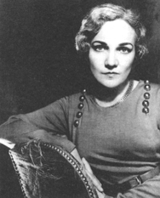 When I and some friends reconnected with our senior-year high school English teacher at Facebook recently, he posted our syllabus, which was amazing to encounter after all this time. The class was my first exposure to Borges, Conrad, Dostoyevsky, Heller, Kafka, and many other writers I still admire.
When I and some friends reconnected with our senior-year high school English teacher at Facebook recently, he posted our syllabus, which was amazing to encounter after all this time. The class was my first exposure to Borges, Conrad, Dostoyevsky, Heller, Kafka, and many other writers I still admire.
Near the start of the year, we read “Noon Wine,” the story that served as my introduction to Katherine Anne Porter. Seeing it listed there reminded me of the new Library of America collection of Porter’s work, which, despite good intentions, I ended up giving short shrift when it appeared last fall.
The anthology includes not only Porter’s short fiction, but her essays and critical works, including an entertaining essay-diatribe on Colette. Here’s an excerpt from “A Most Lively Genius”:
It is hardly fair to American readers to have kept Colette from them for so long; nor fair to Colette, either, who should have been the fashion here at least twenty-five years ago — when we think how her lessers were being brought in all that time with fanfares, from every direction. In France she has been known and loved and read from the beginning, and though one always heard of her as a “light writer,” that was no term of disrespect — quite the contrary. The French above all know how much strength and discipline and even sheer genius it takes to write lightly of serious things; they never called her frivolous, far from it.
Yet there was always that tone of particular indulgence, reserved for gifted women who make no pretentions and know how to keep their place in the arts: a modest second best, no matter how good, to the next ranking males. Westcott, mentioning that both Proust and Gide wrote her letters of praise, says, flatly: “For, now that the inditers are both dead and gone, Colette is the greatest living French fiction writer.”
I agree to this extent: that she is the greatest living French writer of fiction and that she was while Gide and Proust still lived; that these two preposterously afflicted self-adoring, frankly career-geniuses got in Colette’s light; they certainly diminished her standing, though not her own kind of genius. She lived in the same world, more or less in the same time — without their money or their leisure. Where they could choose their occasions, she lived on a treadmill of sheer labor. Compared to their easy road of acknowledged great literary fictures, her life path was a granite cliff sown with cactus and barbed wire.
But she had the immense daylight sense of reality they both lacked and, beyond that, something Gide tried all his life to have, or to appear to have, and which he lacked to the end: a genuine moral sense founded on a genuine capacity for human feeling. She never attempts to haul God into criminal collusion with the spiritual deformities of her characters…
Colette conceals her aim, her end, in her method. Without setting her up in rivalry with her great jealous, dubious male colleagues and contemporaries, let us just be glad of such a good, sound, honest artist, a hard-working one; we could really do nicely with a lot more “light writers” like her. The really light-weight ones weigh a ton beside her.
(Just for the record: I don’t share Porter’s scorn for Proust’s work, which I last read in my early 20s; I haven’t sought out much Gide.)
Porter was famous for inventing and reinventing her life story. “Much of what follows is factually incorrect,” the editors note in a preface to her Paris Review interview. In honor of her ever-changing life story, however, they left “fake enough alone.” (Updated 11/2010: the preface has been removed.)